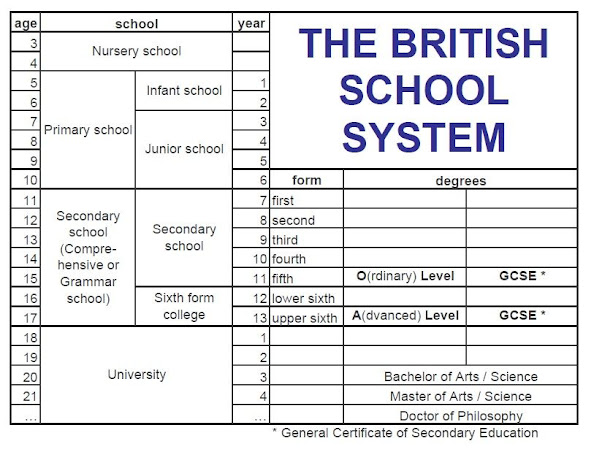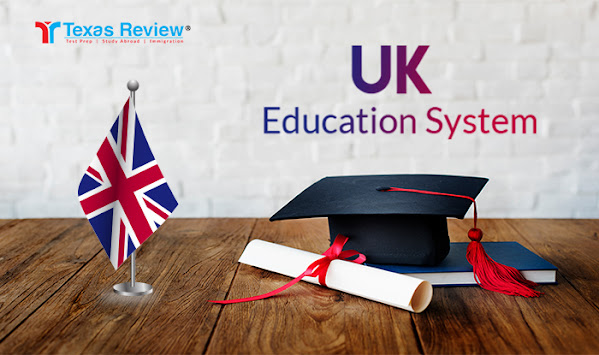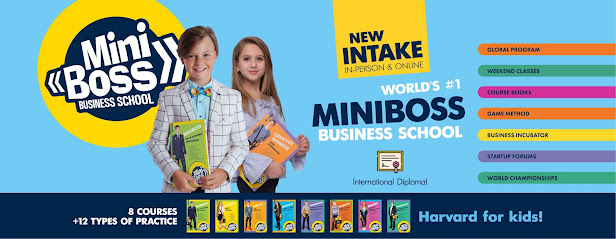The education system in the UK is divided into four main parts:
- primary education
- S1 (5-7 y.o.)
- S2 (7-11)
- secondary education
- S3 (11-14)
- S4 (14-16)
- further education
- higher education
Children in the UK have to legally attend primary and secondary education which runs from about 5 years old until the student is 16 years old. The education system in the UK is also split into "key stages" which breaks down as follows:
- Key Stage 1: 5 to 7 years old
- Key Stage 2: 7 to 11 years old
- Key Stage 3: 11 to 14 years old
- Key Stage 4: 14 to 16 years old
Primary school education begins in the UK at age 5 and continues until age 11, comprising key stages one and two under the UK educational system.
Some primary schools are split up into Infant and Junior levels. These are usually separate schools on the same site. The infant age range (Key Stage 1) is from age 5 to 7. The Junior age range (Key Stage 2) is from age 7 to 11.
The year groups at primary School level are
S1 and S2:
- Year R (Reception) (age 4-5)
- Year 1 (age 5-6)
- Year 2 (age 6-7) The year when SATs testing takes place for Key Stage 1
- Year 3 (age 7-8)
- Year 4 (age 8-9)
- Year 5 (age 9-10)
- Year 6 (age 10-11) The year when SATs testing takes place for Key Stage 2
Secondary School “lower secondary”- Years 7, 8 and 9
Secondary education (including what they call high school in the UK, sixth form, and “college”) lasts for five to seven years. Students between 12 and 16 years old are legally required to attend a secondary school in the UK. This stage of compulsory education is called “lower secondary”.S3 (11-14):
- Year 7 (age 11-12)
- Year 8 (age 12 - 13)
Years 7 and 8 are the first two years of secondary school education in the UK.
In some independent schools they are included in the Junior School, in others, they are part of the Senior School.
Under the UK school system, all students study English, Maths, Sciences, a Humanity and a Modern Language.
Besides these subjects, each school has a list with optional subjects (Art, Music, Drama, Latin, Sport Science, Design Technology, Computer Science), and students may choose a few subjects that interest them.
In some schools, students sit Common Entrance Exam in year 7.
In some independent schools they are included in the Junior School, in others, they are part of the Senior School.
Under the UK school system, all students study English, Maths, Sciences, a Humanity and a Modern Language.
Besides these subjects, each school has a list with optional subjects (Art, Music, Drama, Latin, Sport Science, Design Technology, Computer Science), and students may choose a few subjects that interest them.
In some schools, students sit Common Entrance Exam in year 7.
There are 3 examination sessions, in November, January and May/June. The transition from Junior to Senior School (from year 8 to year 9) may be conditioned by the Common Entrance Exam results in those schools.
- Year 9 (age 13-14)
Students study English, Maths, Sciences, Humanity and Languages.
In addition, students choose a few subjects from the optional subject list offered by each school.
S4 (14-16):
- Year 10 (age 14-15) - GCSE programme
- Year 11 (age 15-16) - GCSE programme
In the UK school system, during the GCSE programme, students study between 9 and 12 subjects.
Some of them are compulsory (English, Math, 2/3 Sciences, History/Geography, a Modern Language etc.), some are chosen by each student according to their abilities and preferences. At the end of the 2nd year (Year 11) GCSE programme, following the examinations on each studied subject, students receive their GCSE Certificates.
The chosen subjects and the GCSE results are very important for their Further Studies (A-Level or IB) and for their University admission.
- Intensive 1 year GCSE (Year 10)
IGCSE
The IGCSE programme (International General Certificate of Secondary Education) prepare international students for A-Level and/or IB.Students study between 5 and 7 subjects, English, Maths and Science being included. Each school has a list of available subjects for IGCSE students. At the end of Year 11, students take exams in each studied subject and receive IGCSE Certificates.
Basic Qualifications: GCSEs and Diplomas
After three years in secondary school, children are officially assessed by their teachers. Students then need to choose their subjects for the nationwide GCSE exams. GCSEs are mandatory examinations at the end of Year 11, i.e. the students’ fifth year in secondary school.
After three years in secondary school, children are officially assessed by their teachers. Students then need to choose their subjects for the nationwide GCSE exams. GCSEs are mandatory examinations at the end of Year 11, i.e. the students’ fifth year in secondary school.
Students usually have to take tests in English, math, and science and they have to choose classes from the fields of arts, humanities, modern languages, technology, and vocational studies as well.
The new National Diploma focuses on practical training, work experience, and a vocational approach rather than academic studies. It can be taken in around 20 different subjects, such as engineering, IT, or creative and media.
The General Certificate of Secondary Education (GCSE) is an academic qualification in a particular subject, taken in England, Wales, and Northern Ireland. State schools in Scotland use the Scottish Qualifications Certificate instead.
Each GCSE qualification is offered in a specific school subject (e.g., Mathematics, Science, History, Geography, Art, Design and Technology). The UK government has drawn up a list of preferred subjects known as the English Baccalaureate and the Progress 8 benchmark metric is calculated on the results in eight GCSEs including English, Maths and Science.
Studies for GCSE examinations take place over a period of two or three academic years (depending upon the subject, school, and exam board), starting in Year 9 or Year 10 for the majority of students, with examinations being sat at the end of Year 11 in England and Wales.
The Scottish Qualifications Certificate (SQC) is the successor to the Scottish Certificate of Education and the Record of Education and Training, and is the main educational qualification awarded to students in secondary, further, and vocational education. The SQC is awarded by the Scottish Qualifications Authority. It forms part of the wider array of qualifications available in the Scottish education system, including Scottish Vocational Qualifications, Higher National Certificates and Higher National Diplomas. Each level is fully integrated with the Scottish Credit and Qualifications Framework and the three upper levels are awarded UCAS Tariff Points.
The SQC recognises performance in National Qualifications, Higher National Qualifications, Scottish Vocational Qualifications and other awards. As it is not part of the National Qualifications Framework of England, Wales and Northern Ireland, it is not available to state schools there, but students from other nations do study for the qualification.
Upon completing lower secondary, students may choose to start work/or go to college or sixth form, where 16 to 18-year-olds prepare for university.
The popularity of many internationally-recognised curriculums means that there are often several schools in a given region to choose from for each system. Whether you have decided on the specific curriculum that is right for your child, or you are still in the process of selecting, it may be helpful to know whether the schools you are considering provide the best possible outcomes based on the curriculum they follow.
University Preparation Further Studies (A-Level or IB) - Years 12 And 13
A-level:
- Year 12 (age 16-17) - A-level
- Year 13 (age 17-18) - A-level
Exams
Most British students usually opt for A-levels rather than a diploma. A-level exams are the main admission requirement for an undergraduate degree at universities in the UK.
Students prepare for their A-levels during Years 12 and 13 in school, the upper secondary stage.
For historical reasons and when 16-year-olds have the option to stay at their secondary school for their A-levels, these two years of education are called “sixth form”, or “lower sixth” and “upper sixth”, in many places.
In Year 12, most students study four subjects of their choice.
One of them is completed at the end of that year as an AS level and dropped afterward. The other three subjects lead up to three full A-levels after Year 13. However, some students may choose to complete four A-levels, despite the extra workload.
Assessment for grading a student’s A-levels is based on coursework, written exams, and – in some cases, e.g. art – their practical skills. The selection and number of A-level courses may already influence a student’s success in applying for university. But no matter how impressed the admission office is with a candidate’s academic skills, he or she will only get a “conditional offer” for a place in a degree course, before they receive their final exam results.
In the UK school system, once a student reaches the age of 16, they can start a 2 year programme which leads to A (Advanced) level examinations. Students specialise in 3 or 4 subjects, that are usually relevant to the degree subject they wish to follow at university. A levels are state examinations and are recognised by all UK universities and by institutions worldwide.
At the end of Year 13, following the examinations in each subject, the students receive A level Certificates.
Students prepare for their A-levels during Years 12 and 13 in school, the upper secondary stage.
For historical reasons and when 16-year-olds have the option to stay at their secondary school for their A-levels, these two years of education are called “sixth form”, or “lower sixth” and “upper sixth”, in many places.
In Year 12, most students study four subjects of their choice.
One of them is completed at the end of that year as an AS level and dropped afterward. The other three subjects lead up to three full A-levels after Year 13. However, some students may choose to complete four A-levels, despite the extra workload.
Assessment for grading a student’s A-levels is based on coursework, written exams, and – in some cases, e.g. art – their practical skills. The selection and number of A-level courses may already influence a student’s success in applying for university. But no matter how impressed the admission office is with a candidate’s academic skills, he or she will only get a “conditional offer” for a place in a degree course, before they receive their final exam results.
In the UK school system, once a student reaches the age of 16, they can start a 2 year programme which leads to A (Advanced) level examinations. Students specialise in 3 or 4 subjects, that are usually relevant to the degree subject they wish to follow at university. A levels are state examinations and are recognised by all UK universities and by institutions worldwide.
At the end of Year 13, following the examinations in each subject, the students receive A level Certificates.
International Baccalaureate (IB)
During the IB, students study 6 subjects, 3 at higher level (HL) and 3 at standard level (SL). Each school offers different subjects at different study levels (HL/SL). The IB programme also includes a compulsory Core programme consisting of Theory of Knowledge (TOK), Extended Essay (EE) and Creativity, Activity, Service (CAS). Students take written examinations on each subject at the end of their courses.










